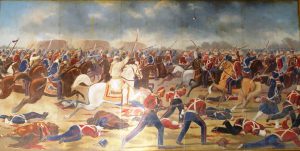The Battle of Sobraon (Sobrahan) was fought on 10 February 1846 between the British forces and the Sikh Khalsa army. The battle was decisively won by the British and this brought an end to the First Anglo-Sikh War.
This article will provide you with relevant facts about the Battle of Sobraon which are useful for the IAS Exam (History) preparation.
See previous ‘This Day in History’ in the linked article.
| Similar to the Battle of Sobraon, there are other important battles in the history of India and the world which are important for the preparation of competitive examinations.
Aspirants can cover such topics mentioned in the UPSC Syllabus by following the below-mentioned links: |
Battle of Sobraon – Background

- The First Anglo-Sikh War had commenced in 1845 when the Khalsa army had crossed the River Sutlej and attacked British positions. This war consisted of a series of battles fought between the Khalsa army and the British Indian Army comprising of the East India Company’s units chiefly the Bengal army. (Learn about the formation of EIC in the linked article.)
- Battles were fought at Mudki, Ferozeshah, Baddowal and Aliwal before the one at Sobraon. All the battles had been won by the British except at Baddowal which was indecisive. But the British victory was hard-fought as the Khalsa army was powerful and aggressive. They had excellent infantry units which had been trained along European lines under the leadership of Maharaja Ranjit Singh. His death in 1839 caused some maladministration in the army. But their gallantry and fighting prowess were praised even by their enemies in battle.
- At the Battle of Sobraon, the British were commanded by the commander-in-chief of the Bengal army, Sir Hugh Gough. The commanders in the Sikh side included Sardar Tej Singh, Sardar Lal Singh and Sardar Sham Singh Attariwala.
- In the battle that ensued on 10 February, the British forces attacked the weakest point of the Sikh defence. Again, it is believed that Lal Singh had supplied this vital information to the British.
- After the fierce battle was fought and firing ceased, the Sikhs had lost about 10000 men and 67 of their guns. The British suffered about 230 casualties.
- It was a decisive victory for the British. This marked the end of the First Anglo-Sikh War. The Treaty of Lahore was signed on 9 March 1846 between the Governor-General Henry Hardinge and Maharaja Duleep Singh, the 7-year old king of the Sikh Empire. This treaty reduced Sikh territorial possessions a great deal and also handed independence to the Raja of Jammu Gulab Singh, who acquired Jammy by paying a sum to the East India Company. A British resident was to be appointed at the Lahore Durbar.
Read about the Second Anglo-Sikh War in the linked article.
| Also on this day 1805: Birth of Kuriakose Elias Chavara who was canonised by the Catholic Church in 2014. 1916: Revolutionary Sohanlal Pathak was hanged at the Mandalay jail by the British. 2013: Stampede in Kumbh Mela at Allahabad killed 36 people. |
UPSC Preparation Links:
| UPSC 2021 | UPSC Mains Strategy |
| UPSC Prelims 2021 | UPSC Notes PDF |
| Download NCERT Books PDF for UPSC | UPSC Syllabus |
Comments